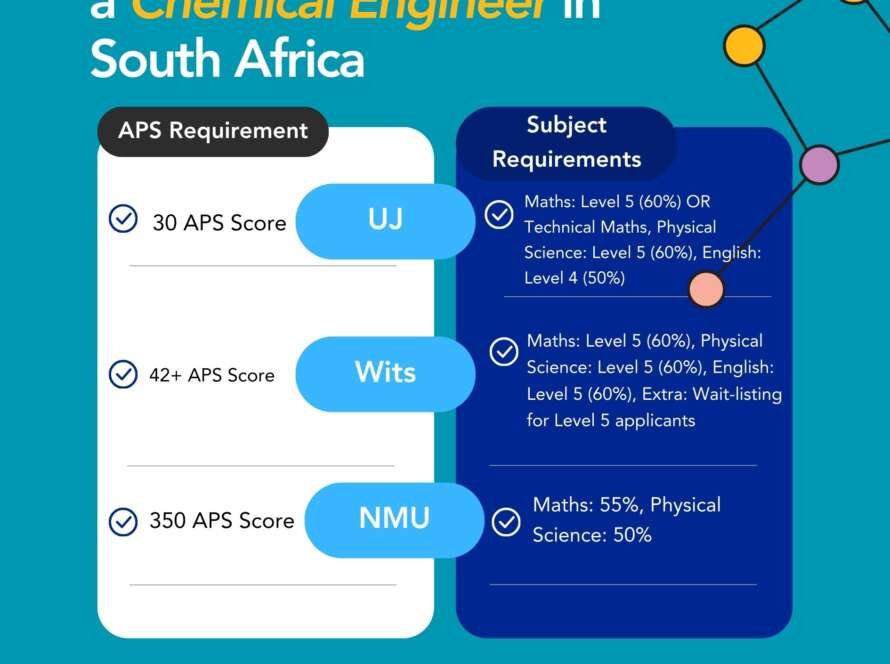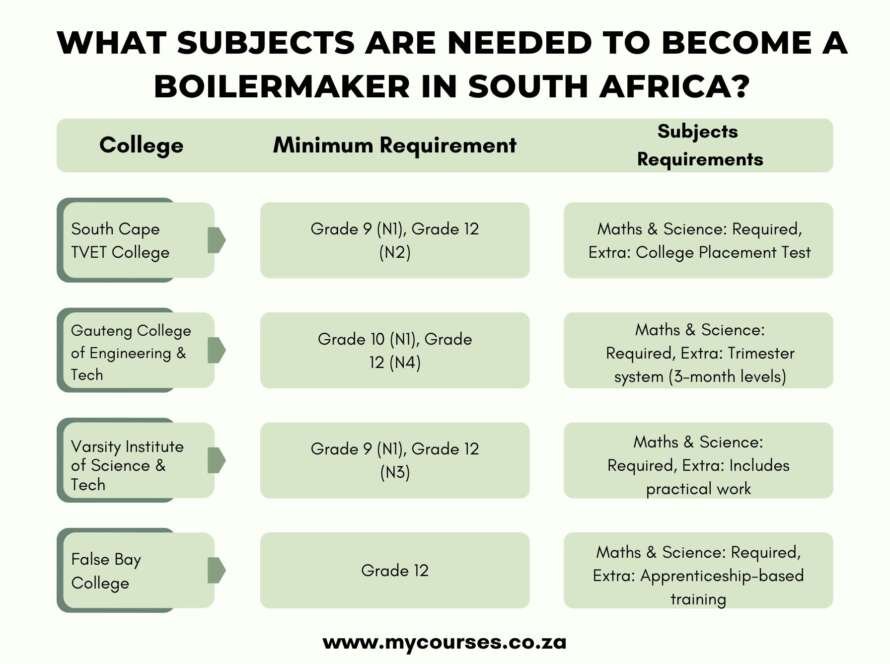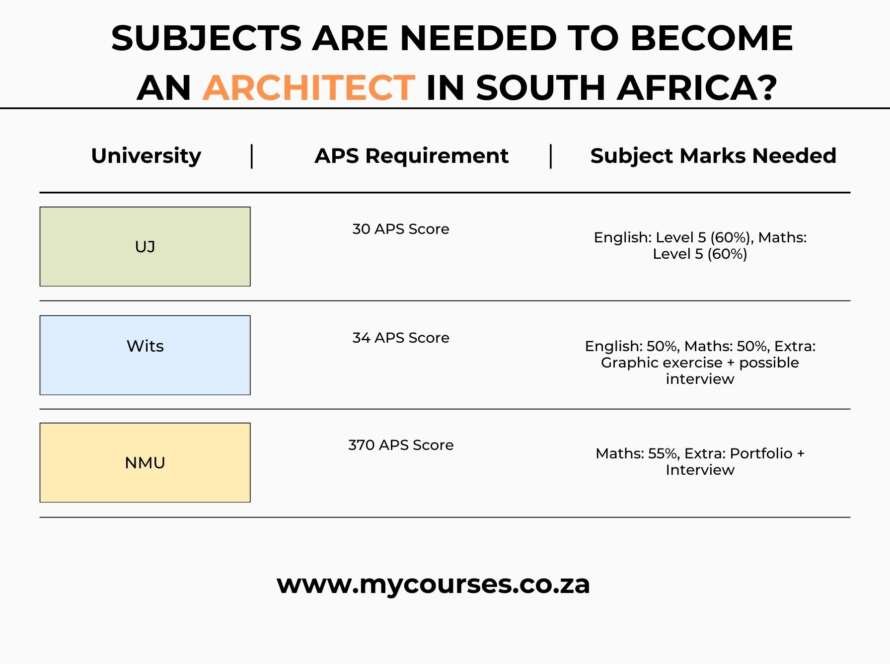We looked at the entry requirements for Civil Engineering degrees at some of South Africa’s top universities, including UJ, Wits, UFS, NMU, and Stellenbosch University. So, if you’re thinking of becoming a civil engineer in South Africa, this guide will help you understand what subjects you need in high school to qualify.
We’ve also included official course links so you can check out the details and apply when you’re ready.
Just a heads-up—Mathematics and Physical Science are non-negotiable! If problem-solving, working with structures, and designing roads, bridges, and buildings excites you, then civil engineering might be your perfect career!
List of Subjects Needed to Become a Civil Engineer in South Africa
Below are the subjects required to become a civil engineer, based on actual university requirements:
1. University of Johannesburg (UJ) – BEng in Civil Engineering
Below are the required subjects at UJ for a BEng in Civil Engineering, in order to become a civil engineer:
UJ offers a BEng in Civil Engineering, designed for students who want to work in construction, infrastructure development, and structural design.
Admission Requirements:
- APS Score: 32
- Subjects Required:
- English: Level 5 (60%)
- Mathematics OR Technical Mathematics: Level 5 (60%)
- Physical Science: Level 5 (60%)
2. University of the Witwatersrand (Wits) – Bachelor of Science in Civil Engineering
Below are the required subjects at Wits for a BSc in Civil Engineering, in order to become a civil engineer:
Wits offers a four-year Civil Engineering degree, preparing students for careers in structural, environmental, and transportation engineering.
Admission Requirements:
- APS Score: 42+
- Subjects Required:
- English Home Language OR First Additional Language: Level 5 (60%)
- Mathematics: Level 5 (60%)
- Physical Science: Level 5 (60%)
- Wait-listing:
- If you have Level 5 in English, Mathematics, and Physical Science, you may be wait-listed, depending on space.
- Applicants with Level 6 in these subjects have a higher chance of being accepted.
3. University of the Free State (UFS) – Civil Engineering Degree
Below are the required subjects at UFS for a Civil Engineering Degree, in order to become a civil engineer:
UFS offers a Civil Engineering programme with a focus on practical applications and problem-solving in infrastructure development.
Admission Requirements:
- APS Score: 30
- Subjects Required:
- Mathematics: Level 6
- Physical Science: Level 5
- Language of Instruction (English/Afrikaans): Level 4
- Additional Requirement:
- Completion of the National Benchmark Test (NBT)
4. Nelson Mandela University (NMU) – Bachelor of Engineering Technology in Civil Engineering
Below are the required subjects at NMU for a BEngTech in Civil Engineering, in order to become a civil engineer:
NMU offers a Bachelor of Engineering Technology in Civil Engineering, focusing on technical and practical aspects of engineering.
Admission Requirements:
- Minimum Applicant Score: 370
- Subjects Required:
- Mathematics OR Technical Mathematics: 60%
- Physical Science OR Technical Science: 50%
- Alternative Entry:
- Applicants with a Higher Certificate in Mechatronics Engineering (with 60% average and 60% in Mathematics1001) can also apply.
- Other Considerations:
- Adults with prior engineering experience may also qualify through Recognition of Prior Learning (RPL).
5. Stellenbosch University (SUN) – Bachelor of Engineering (BEng) in Civil Engineering
Below are the required subjects at Stellenbosch University for a BEng in Civil Engineering, in order to become a civil engineer:
Stellenbosch University offers a highly regarded Civil Engineering degree, preparing students for careers in structural, water, and geotechnical engineering.
Admission Requirements:
- Overall Matric Average: 70%
- Subjects Required:
- Mathematics (NOT Maths Literacy): 70%
- Physical Science: 60%
- Other Requirements:
- Matriculation exemption or equivalent qualification is required.
Final Thoughts – Which One Is Easier to Qualify For?
If you’re looking for the easiest entry, NMU has the lowest Mathematics requirement (60%) and Physical Science requirement (50%), making it a great option if you don’t meet the stricter BEng requirements.
For the most competitive entry, Wits and Stellenbosch require the highest APS (42+ and 70% average, respectively), making them the toughest options.
UJ and UFS fall somewhere in between:
- UJ requires an APS of 32, making it easier than Wits but still competitive.
- UFS has an APS requirement of 30 but includes the NBT, which adds an extra selection step.
Comparison Table of Civil Engineering Degree Requirements
| University | Course Name | APS | Maths | Physical Science | English | Extras |
|---|---|---|---|---|---|---|
| UJ | BEng in Civil Engineering | 32 | Level 5 (60%) OR Technical Maths | Level 5 (60%) | Level 5 (60%) | None |
| Wits | BSc in Civil Engineering | 42+ | Level 5 (60%) | Level 5 (60%) | Level 5 (60%) | Wait-listing for Level 5 applicants |
| UFS | Civil Engineering Degree | 30 | Level 6 | Level 5 | Level 4 | National Benchmark Test (NBT) |
| NMU | BEngTech in Civil Engineering | 370 Score | 60% OR Technical Maths | 50% OR Technical Science | Not specified | Alternative entry for Mechatronics students |
| SUN | BEng in Civil Engineering | 70% Average | 70% | 60% | Not specified | Matriculation exemption required |
Final Verdict
- For the easiest entry: NMU (Lower Mathematics & Physical Science requirements).
- For the hardest entry: Wits & Stellenbosch (Highest APS & subject requirements).
- For a balance between theory and practical work: UJ (Accepts Technical Mathematics and has a moderate APS).
Civil Engineering is a rewarding and high-paying career that requires strong analytical skills, problem-solving, and technical knowledge. If you love designing, building, and improving infrastructure, this could be the perfect career for you!
Career Journey to Becoming a Civil Engineer in South Africa
Below is a career journey you are likely to take if you would like to become a Civil Engineer in South Africa. This is just an overview for you, so that you get an idea:
1. University Studies
To become a civil engineer, you must complete a degree at one of these universities:
- Nelson Mandela University (NMU) – BEngTech in Civil Engineering (Alternative entry for Mechatronics students)
- University of the Free State (UFS) – Civil Engineering Degree (Requires NBT)
- University of Johannesburg (UJ) – BEng in Civil Engineering
- University of the Witwatersrand (Wits) – BSc in Civil Engineering (Wait-listing for Level 5 applicants)
- Stellenbosch University (SUN) – BEng in Civil Engineering (Requires Matric Exemption)
The degree takes four years and includes subjects like structural, geotechnical, water, and transportation engineering.
2. Work Integrated Learning (WIL) & Internship
After completing your degree, you need practical experience:
- Internships or vacation work during university (some universities make this compulsory)
- Graduate Engineer or Engineer-in-Training (EIT) positions in construction firms, government departments, or private companies
- Tasks include design calculations, site inspections, and project planning
3. Professional Registration with ECSA
To work as a Professional Engineer (Pr Eng), you must register with the Engineering Council of South Africa (ECSA). The process includes:
- Completing three years of work experience
- Submitting a portfolio of projects
- Passing a professional review
4. First Day at Work
- Site visits and project briefings
- Assisting with engineering designs and reports
- Working under senior engineers
Once registered, you can specialise in transportation, structural, or water engineering and qualify for senior positions.






